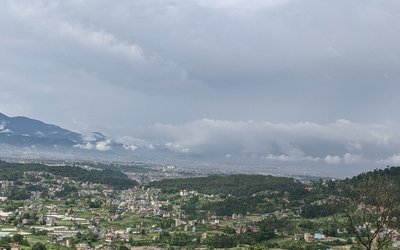
The 28th Conference of the Parties(COP-28) highlighted the urgent need for action in response to the rapid melting of the Himalayan glaciers, which threatens the very existence of mountain and lowland communities, water security, and food for billions. The UN Secretary-General, Antonio Gutteres, and Nepal’s Prime Minister, Puspha Kamal Dahal, played a crucial role in amplifying the cry for help from the melting glaciers and raising awareness about the interconnectedness of mountain and lowland communities with the global fight against human-induced climate change.
The conference endorsed a move away from fossil fuels and increased attention to methane emissions acknowledging the need for policies and regulations to slow the powerful greenhouse gas’s impact. However, the conference also highlighted the challenges that remain, such as bridging the financial gap for vulnerable regions and ensuring commitments translate into real-world actions.

After attending many COPs, or Conference of Parties, I have learned over the years that COPs are not about absolute victory or crushing defeat, but rather intricate negotiations where progress can be made, hope can flicker, and the future can inch closer to sustainability. Negotiations at COPs are complex and require compromise. While progress can be made, it is important to remember that COPs are not pronouncements of absolute victory or loss or a success or a failure.
Though COPs offer a platform for compromise, the global community hungers for action and will no longer be satisfied with mere statements. The time for action is now, and the melting glaciers demand a laser focused response. Therefore, there is an urgent need for a dedicated inter-governmental organization solely focused on studying glaciers and their downstream impacts. Such an organization would complement and bolster the efforts of existing organizations like the International Center for Integrated Mountain Development ( ICIMOD), Mekong River Commission (MRC) and similar other organizations. The need for a world-class action-oriented consortium of nations, equipped with cutting-edge research capabilities, robust data collection systems, and the mandate to translate knowledge into actionable transboundary policies and programs, is crucial for addressing global challenges such as climate change, transboundary water management, and international security. This consortium would partner with international, regional and national stakeholders, sharing expertise, and empowering them to become stewards of their own glacial heritage.
The Himalayan glaciers sustain not only the ecosystems but also the rich and diverse cultures of eleven countries, with over 2 billion people, that are dependent on rivers originating from these glaciers – almost one-third of humanity– rely on them. From Afghanistan to Vietnam, from the Yangtze in China to the Ganges in India, these glacier-fed rivers serve as the lifeblood of mountain and lowland communities, providing them with water, fertile lands for agriculture, and sources of livelihood. They are also deeply interwoven with religious and cultural practices, serving as sacred sites and symbols of resilience and strength. The melting of these glaciers poses a grave threat not only to the physical environment but also to the ecosystems, biodiversity, cultural fabric and heritage of these nations/states and has the potential to lead to conflicts over water resources. Preserving these glaciers becomes not only an environmental imperative but also a mission to safeguard the essence of these 11 nations and the communities that have been calling them home for millenniums.
Additionally, the Intergovernmental Panel on Climate Change (IPCC) and various scientific studies have also highlighted the impacts of the melting of the Himalayan glaciers on water resources, ecosystems and communities in the region.

The private sector, fossil fuel industries, civil societies, technological advancements, and unwavering political will are essential partners in this critical endeavor. Collaboration between NGOs, businesses, and academics can unlock diverse perspectives and drive innovation in climate solutions, providing crucial support for the lead actors. Investing in clean technologies and fostering knowledge sharing are vital for accelerating the transition to a low carbon future, ensuring that the music does not fade out. Addressing human-induced climate change necessitates a steadfast commitment from both industrialized and developing nations. Without the collective effort, the fight against climate change may lose its direction and effectiveness.
Let COP-28 be a springboard of action, not just a stage for promises. Let us amplify the tears of the melting glaciers and the cry of the mountain and lowland communities, translating it into a united voice demanding a dedicated intergovernmental organization. Together, we can transform the echoes of despair into a symbol of optimism and hope, securing a future for the majestic Himalayas and those who depend on.

Arup Rajouria
is an internationally recognized expert in climate change and natural resources management, with an impressive career at renowned organizations such as the former CEO of NTNC's CEO, UNDP, UN-Habitat, UNEP, and USAID. He obtained an MPA degree from Harvard
- Beyond the Mirage of Glacier Preservation: 2025 and the GLOF Crisis
- Jul 09, 2025
- Glaciers Demand: Annapurna’s Lesson
- Jun 05, 2025
- 2024: A Year Of Missed Opportunities- A Call For Transformative Climate Action In 2025
- Dec 31, 2024
- Himalayan Meltdown: Threat Beyond Borders
- May 10, 2024
- Navigating The River of Doubts: The Evolving Dynamics Of India-Nepal Water Relations
- Jan 08, 2024














